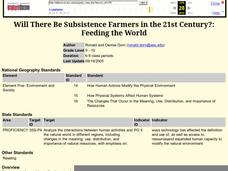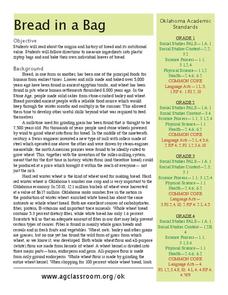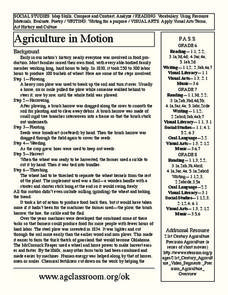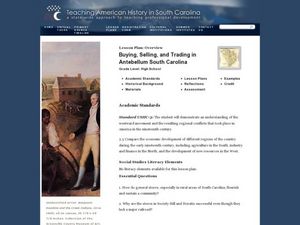Curated OER
Will There Be Subsistence Farmers in the 21st Century?: Feeding the World
Students examine the topic of subsistence farming. They research the future of subsistence agriculture, identify the types and locations of subsistence agriculture, and write about subsistence farming in regards to developing nations and...
Curated OER
Two Rivers Ran Through It
Sixth graders discover the problems that early Mesototamian farmers faced while developing agriculture in the land between the Tigris and Euphrates Rivers. They design a working model that solves those unique challenges.
Curated OER
Inventions Over Time
Explore the inventions of the past with a project on ancient tools. After reading an article about hunting during the Archaic period, the Late Prehistoric period, and the Historic period, kids fill in a cause-and-effect chart about the...
Curated OER
Bread in a Bag
Could the history of bread really be interesting? Yes, it could! An informational text gives scholars wheat production background from 8,000 years ago, discussing different types of bread and the current industry in Oklahoma. Learners...
Curated OER
Agriculture: Oklahoma's Legacy
Students continue exploring the history of Oklahoma Agriculture in this lesson. They trace several historical migrations to the state of Oklahoma. They simulate the customs and conditions of a chosen migration. Vocabulary and resource...
Curated OER
Hopi Agriculture
Students discuss the farming practices of the past and present of the Hopi people and discuss the importance of corn. For this Hopi agriculture lesson plan, students also plant their own seeds of corn.
Curated OER
Agriculture: Oklahoma's Legacy
Students explore the history of Oklahoma agriculture. They listen to the story "The Story of Oklahoma Agriculture." They are then divided into groups where they act out one or more of the events in the story. Students draw pictures ot...
Curated OER
Ancient Mediterranean Lands: Rome
Seventh graders research ancient Roman civilizations, trade routes, aqueducts, and agriculture. In this Ancient Rome lesson, 7th graders view a picture of the Roman Aqueduct Pont du Gard and discuss its use in ancient Rome. Students read...
Curated OER
Ancient India
Sixth graders create a travel brochure highlighting the accomplishments of the Indus Valley civilization. Group work allows students to create brochures illustrating the location, government, religion, agriculture, cultural and...
Curated OER
Agriculture in Motion
Sixth graders write a poem and an essay about the machines they have learned about that are used in agriculture. In this machines lesson plan, 6th graders compare different kinds of machines and discuss the economic impact machines in...
Curated OER
An Ancient Greek and Roman Festival
Third graders label a map of ancient Greek and Roman civilizations and do a written report on one element of these two cultures. They participate in discussions of food, farming, daily life and government (among others). Students use the...
Curated OER
The History of Rice
Fourth graders investigate the history of rice by drawing a timeline of important dates. In this food history lesson, 4th graders research the history of rice, where it came from, and who first used it for food. Students create a...
Curated OER
Korean History Through Journaling
Students explore Korea and details about the Choson Kingdom. In this Korea lesson, students examine the geographical location of Korea. Students also take notes on a lecture about the Choson Kingdom and relations between Japan and Korea....
Curated OER
Impacting Indiana
Fourth graders explore Indiana. In this Indiana history lesson, 4th graders discuss how Indiana has developed through the years. Students discuss Indiana agriculture and follow a recipe using ingredients from Indiana crops. Students view...
Curated OER
Kensington Mansion: Plantation, Sharecroppers, Tenants
Eleventh graders investigate the significance of the Kensington Mansion. In this South Carolina history lesson, 11th graders take field trips to the mansion and research primary and secondary sources about plantations, sharecropping, and...
Curated OER
Back to the Farm
Students complete a family tree. In this farming and ranching lesson, students define the term genealogy, learn how to create a family tree, and fill in a family tree with the help of their parents making sure to note if any of their...
Curated OER
Situation of America, 1848
Students explore 19th century American artwork. In this cross curriculum New York history and art appreciation lesson, students view a reproduction of the painting "Situation of America, 1848," and identify visual symbols and details ...
Curated OER
Buying, Selling, and Trading in Antebellum South Carolina
Students research the role of general stores in the development of communities. For this South Carolina history lesson, students study the economic development of early U.S. communities. Students write essays and create advertisements...
Curated OER
From Slave to Entrepreneur: The Life and Times of William Ellison
Eighth graders interpret historical evidence presented in primary and secondary resources. For this South Carolina history lesson, 8th graders examine sources that require them to examine the life of William Ellison, a black slave owner.
Curated OER
Ancient Mediterranean Lands: A Timeline of Mediterranean Civilizations
Sixth graders explore world history by participating in a class agriculture activity. In this wheat weaving lesson, 6th graders identify the different Mediterranean regions that adopted early agriculture methods and expanded their...
Describing Egypt
Ptah-Hotep and Akhet-Hotep Mastaba
Did you know that mastaba means bench in Arabic? Learn why a mastaba was so important to ancient Egyptian architecture. Middle and high schoolers alike stay entertained while reading a passage that describes the virtual tour of...
Facts and Files
The Nile
While it may not be possible to take an entire class to Egypt and explore the ancient wonders, it is possible to engage your young historians in activities that ask them to research these and other antiquities and place them on their...
Curated OER
Tennessee: The Volunteer State Part 2
If you're planning a trip to Tennessee or just teaching a lesson on the state, you'll find this resource very useful. The agriculture, industry, music, and demographics of the state of Tennessee are discussed. This is the second in a...
Curated OER
Agriculture Counts
Students understand the importance of counting in their lives.In this counting lesson, students participate in a counting agricultural goods activity. Students complete worksheets and understand why counting is important in agriculture.

























